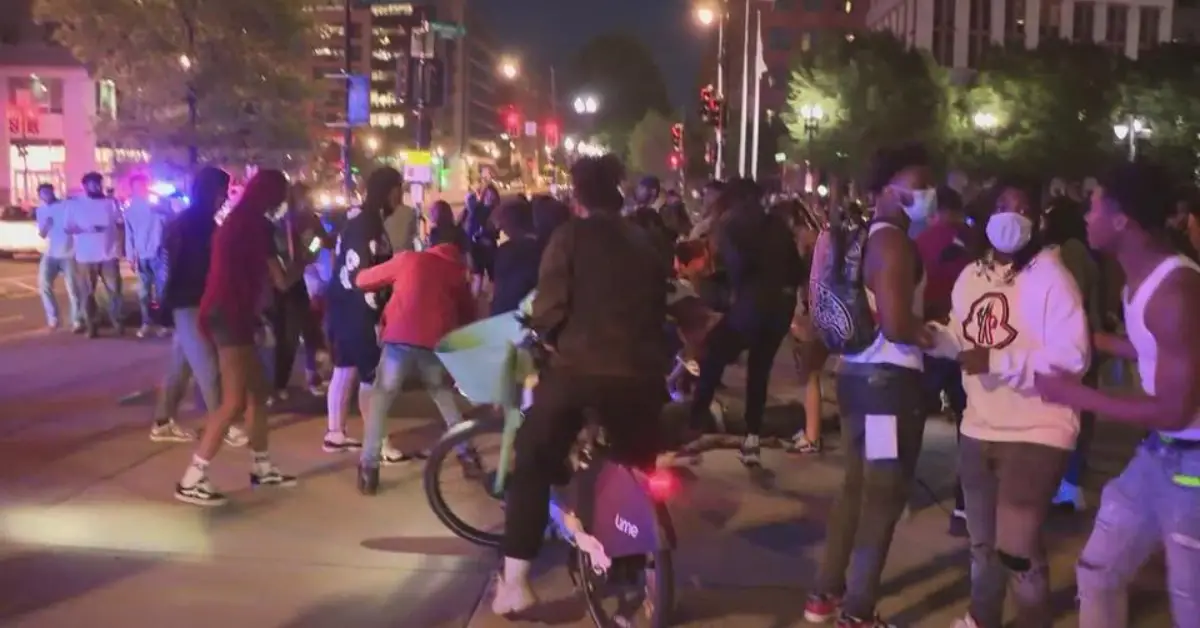Washington D.C. has been seeing a sharp rise in large, unplanned gatherings of teenagers, especially in busy commercial areas. These gatherings, often organized via social media, are being described as “teen takeovers” and are causing real concerns for both public safety and local businesses. While many teens may see these gatherings as harmless fun, the impact on residents and small business owners has been serious, with some shops closing early or losing customers due to the chaos.
Several incidents have drawn attention to this growing problem. Groups of 100 to 300 teens have been seen taking over streets, shopping areas, and public spaces. Videos posted online show young people dancing, shouting, and sometimes even vandalizing property or fighting. The problem isn’t unique to DC—similar events have occurred in cities like Chicago and Philadelphia—but it has recently become more frequent in the nation’s capital, especially on weekends.
The DC government is taking this issue seriously. Mayor Muriel Bowser has called for a coordinated response between law enforcement, community leaders, and youth outreach organizations. The Metropolitan Police Department (MPD) has started increasing patrols in certain neighborhoods and popular hangout spots, including Gallery Place, Chinatown, and U Street. Police Chief Pamela Smith emphasized that while the city doesn’t want to criminalize youth behavior, public safety must come first.
Meanwhile, local business owners are feeling the pressure. Restaurants, clothing stores, and small shops say that the teen mobs are scaring away regular customers and making it difficult for staff to manage their shifts. Some owners have had to shut down early or increase security, which adds to their financial burden. A few businesses have reported minor damages and theft during these events. Many are now calling on city leaders to take quicker and firmer action.
One of the key issues being discussed is how to prevent these gatherings without increasing tension between police and young people. Community groups and youth advocates are urging a balanced approach that focuses on engagement, not just enforcement. They believe the city needs more investment in teen programs, after-school activities, and safe spaces for young people to socialize. Some point out that school closures, lack of job opportunities, and boredom contribute to this kind of behavior.

In response, DC officials are planning several steps. First, they’re considering a curfew for minors in specific areas, especially during weekends or holidays. This idea has sparked mixed reactions. Some feel it will help reduce the problem, while others worry it could lead to more confrontations between police and youth.
Second, the city is increasing its coordination with social media platforms to monitor and respond to potential flash mob events before they happen. Officials are also encouraging parents to talk with their kids about where they’re going and what they’re doing during evenings out.
Third, the city may expand its summer youth employment and recreation programs to give teens more productive things to do. The Department of Parks and Recreation is working on launching late-night events, such as sports tournaments and music nights, aimed at keeping teens engaged in safe environments.
For now, business owners and residents remain cautious. Some say they’ve seen improvements with the increased police presence, while others believe it’s just a short-term fix. “We need long-term solutions,” said one store owner in Chinatown. “We want young people to enjoy the city, but it has to be safe and respectful.”
Parents are also concerned. Many say they didn’t know their teens were part of these gatherings and are now setting stricter rules at home. Others argue that the responsibility shouldn’t fall only on parents and that the city must do more to offer alternatives for bored or unsupervised teens.
As summer approaches and school breaks begin, city leaders are under even more pressure to find solutions that work. With the potential for even larger crowds, especially around the Fourth of July holiday and summer weekends, this issue is not going away anytime soon.
In the end, most agree that the goal isn’t to punish teenagers, but to keep the city safe and supportive for everyone. That means creating better communication between young people, parents, community groups, and government agencies. Whether through outreach, stricter rules, or more youth opportunities, DC will have to act quickly and thoughtfully to deal with these teen takeovers before they cause more disruption.




